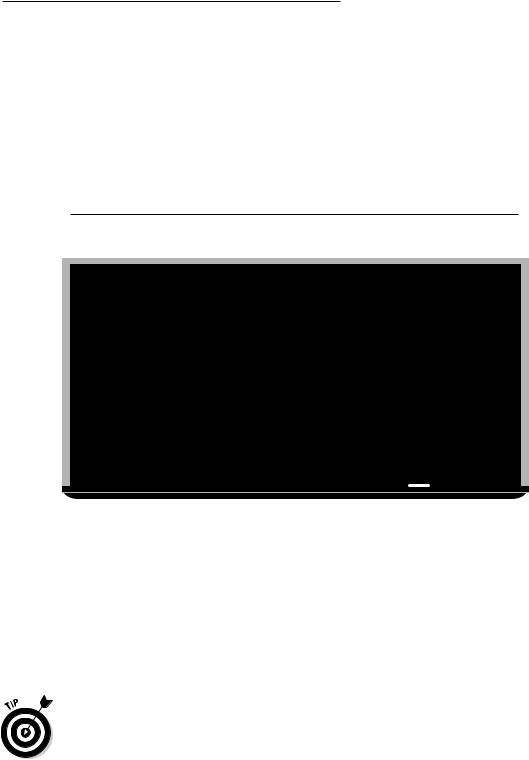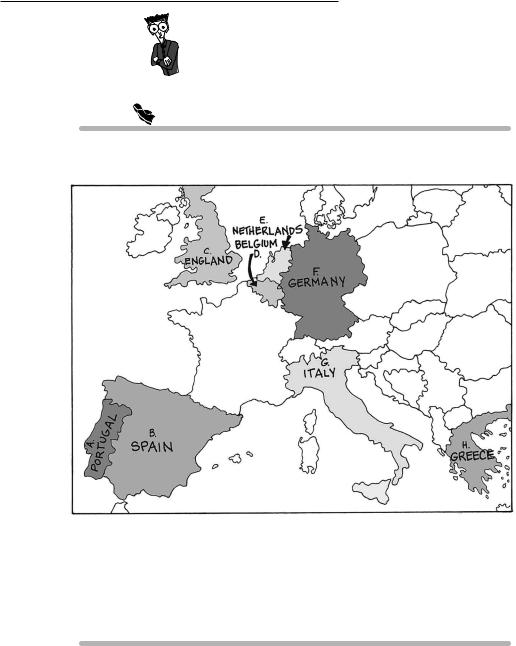
- •About the Authors
- •Dedication
- •Acknowledgments
- •Table of Contents
- •Introduction
- •About This Book
- •Conventions Used in This Book
- •Foolish Assumptions
- •How This Book Is Organized
- •Icons Used in This Book
- •Where to Go from Here
- •The French You’re Familiar With
- •Idioms and Popular Expressions
- •Key Parts of Speech
- •Cavorting with Verbs
- •Forming Sentences and Questions
- •The French Alphabet
- •Uttering Vowel and Consonant Sounds
- •Greetings: Formal and Friendly
- •Asking Questions to Get to Know People
- •Counting Your Lucky Stars: Numbers
- •Using the Calendar and Dates
- •Telling Time in French
- •Discussing Where You Live with the Verb “Habiter”
- •Discussing Daily Routine with Reflexive Verbs
- •Using Possessive Adjectives to Introduce Your Family Members
- •Basic Questions and Polite Expressions
- •Stating Your Preferences
- •Talking about Your Livelihood
- •Chatting about the Weather
- •Deciding to Keep in Touch
- •Getting Direction about Directions
- •Dining Out
- •Going to the Market
- •Going Shopping
- •Going Out with the Verb “Sortir”
- •Having Fun with the Verb “S’amuser”
- •Oh, the Places You’ll Go!
- •Making Plans with Friends
- •Making a Phone Call
- •Livin’ in the Past: Using the Past Tense
- •Playing Sports and Games
- •Going to the Beach
- •Setting Up Camp
- •Enjoying Quieter Pursuits
- •Where Do You Want to Go?
- •Getting Ready for Your Trip
- •Getting Current with Currency
- •Going to the Bank
- •Using Credit Cards and ATMs
- •Getting through the Airport
- •Navigating Buses, Trains, and Subways
- •Getting Around by Car
- •Finding Accommodations
- •Checking In to a Hotel
- •Checking Out of a Hotel
- •Getting Help Fast
- •Getting Medical Help
- •Handling Legal Matters
- •Label the Things in Your House
- •Write Your Shopping Lists in French
- •Listen to French Music
- •Watch French Movies
- •Tune in to TV5
- •Read French Publications
- •Take a Class
- •Join a French Association
- •Join an Online Chat or Pen Pal Forum
- •Using “Tu” When You Mean “Vous”
- •Using “Bonne nuit!” for Good-Bye
- •Using “Garçon” or “Porteur” to Address Service Staff
- •Saying “Je suis excité(e)” to Indicate Excitement
- •Saying “Je suis chaud(e)/froid(e)” to Say You’re Hot or Cold
- •Saying “Je suis plein/e” to Mean You’re Full
- •Using “de la glace” to Request Ice
- •Using “Je suis . . . ans” to Tell Your Age
- •Asking for Change with “J’ai besoin de change”
- •Using the Verb “Visiter” in Reference to People
- •“À mon avis”
- •“C’est pas vrai”
- •“Avec plaisir”
- •“C’est génial”
- •“À votre santé”
- •“À vos souhaits”
- •“Quelle horreur!”
- •“À bientôt”
- •“Passez-moi un coup de fil!”
- •“On y va!” or “Allons-y!”
- •“Je n’en sais rien”
- •“Je n’en reviens pas”
- •“Ça vaut la peine”
- •“C’est pas grave”
- •“N’importe”
- •“Tu cherches midi à 14h”
- •“Prenons un pot!”
- •Regular French Verbs
- •Auxiliary French Verbs
- •Track Listing
- •Customer Care
- •Index

|
|
|
Chapter 13: Planning a Trip 217 |
|
|
|
|
||
|
|
|
|
|
|
Verb |
Stem |
||
|
|
|
|
|
|
recevoir (ruh-suh-vwahr) (to receive) |
recevr (ruh-suh-vruh) |
|
|
|
savoir (sah-vwahr) (to know) |
saur (sohr) |
|
|
|
venir (vuh-neer) (to come) |
viendr (vyehn-druh) |
||
|
|
|
|
|
|
voir (vwahr) (to see) |
verr (vehr) |
||
|
|
|
|
|
|
vouloir (vooh-lwahr) (to want) |
voudr (vooh-druh) |
|
|
Here are some sentences that use the future tense with these irregular verbs:
Je serai prêt/prête. (zhuh suh-rey preh/preht.) (I will be ready.)
Nous recevrons les passeports. (nooh ruh-suh-vrohN ley pahs-pohr.) (We will receive the passports.)
Getting Ready for Your Trip
When you plan your trip, you’re likely to hear the questions Où voulez-vous aller? (ooh vooh-ley-vooh-zah-ley?) (Where do you want to go?). To answer this question, you simply say Je voudrais aller à. . . . (zhuh vooh-dreh-zah- ley ah. . . .) (I would like to go to. . . .). If you’re working with a travel agent, you may also hear Quand voulez-vous partir? (kahN vooh-ley-vooh pahrteer?) (When do you want to leave?) and Quand voulez-vous revenir? (kahN vooh-ley-vooh ruh-vuh-neer?) (When do you want to come back?) Refer to Chapter 4 for information on making date references. If you’re reserving seats, you will be asked Pour combien de personnes? (poohr kohN-byaN duh pehr-sohhn?) (For how many people?) To answer, simply say Pour. . .
personnes (poohr. . . pehr-sohhn) (For. . . people).
Talkin’ the Talk
While her friends are in New York making their own travel arrangements, Anne is at a Paris travel agency booking her and her husband’s flight to Nice. (Track 14)
Anne: Bonjour, monsieur. bohN-zhoohr, muh-syuh.
Good morning, sir.
Agent: Bonjour, madame. Vous désirez? bohN-zhoohr, mah-dahm. vooh dey-zee-rey?
Good morning, ma’am. Can I help you?
www.ATIBOOK.ir

218 Part III: French on the Go
Anne: Nous voudrions prendre l’avion pour Nice en décembre.
nooh vooh-dree-ohN prahN-druh lah-vyoN poohr nees ahN dey-sahN-bruh.
We would like to take a plane to Nice in December.
Agent: |
C’est pour combien de personnes? |
|
seh poohr kohN-byaN duh pehr-sohhn? |
|
For how many people? |
Anne: |
Pour deux personnes, monsieur. |
|
poohr duh pehr-sohhn, muh-syuh. |
|
For two people, sir. |
Agent: |
Et pour quelle date? Vous voulez rester pour combien |
|
de jours? |
|
ey poohr kehl daht? vooh vooh-ley reh-stey poohr |
|
kohN-byaN duh zhoohr? |
|
And for which date? How many days do you want |
|
to stay? |
Anne: |
Dix jours: du 22 décembre au 2 janvier. |
|
dee zhoohr: dew vahNt-duh dey-sahN-bruh oh duh |
|
zhahN-vyey. |
|
Ten days: from the 22nd of December to the 2nd |
|
of January. |
Agent: |
Vous avez de la chance. J’ai encore deux places. |
|
Votre nom? |
|
vooh-zah-vey duh lah shahNs. zhey ahN-kohr duh |
|
plahs. vohh-truh nohN? |
|
You’re lucky. I still have two seats. Your name? |
Anne: |
Anne et Michel Brasse: B-R-A-S-S-E. |
|
ahn ey mee-shehl brahs: bey ehr ah dooh-bluh ehs uh. |
|
Anne and Michel Brasse: B-R-A-S-S-E. |
Agent: |
C’est le vol Air France 6002 qui part à 10 heures de |
|
Charles de Gaulle. Ça vous convient? |
|
seh luh vohl ehr frahNs see meel duh kee pahr ah |
|
deez-uhr duh shahrl duh gohl. sah vooh kohN-vyaN? |
|
It’s the Air France flight #6002 which leaves at 10 a.m. |
|
from Charles de Gaulle. Does that suit you? |
Anne: |
Oui, c’est parfait. À quelle heure est-ce qu’il arrive? |
|
wee, seh pahr-feh. ah kehl uhr ehs-keel ah-reev? |
|
Yes, that’s perfect. At what time does it arrive? |
www.ATIBOOK.ir

Chapter 13: Planning a Trip 219
Agent: Il arrive à Nice à 11h30.
eel ah-reev ah nees ah ohNz uhr trahNt.
It arrives in Nice at 11:30 a.m.
Anne: Bon. Pouvez-vous réserver deux sièges pour nous? bohN. pooh-vey-vooh rey-sehr-vey duh syehzh poohr nooh?
Good. Can you reserve two seats for us?
Agent: Mais oui, bien sûr. meh wee, byaN sewr. Yes, of course.
Words to Know
je reviens |
zhuh ruh-vyaN |
I am coming back |
|
|
|
voyager |
voh-yah-zhey |
to travel |
|
|
|
le vol |
luh vohl |
the flight |
|
|
|
le siège |
luh syehzh |
the seat |
|
|
|
le lendemain |
luh lahN-duh-mahN |
the next day |
|
|
|
Introducing the indirect object pronouns
The preceding dialogue uses the phrase Ça vous convient? (sah vooh kohNvyaN?), which translates as Does that suit you? or Is that convenient for or suitable to you? The vous in this sentence is the indirect object pronoun. The indirect object pronoun replaces the indirect object (the noun) that follows the preposition à in the sentence). For example, in the sentence Je parle à Pierre (zhuh pahrl ah pyehr) (I am speaking to Pierre), Pierre is the indirect object. You can replace à Pierre with the indirect object pronoun lui (lwee) (to him) to form the sentence Je lui parle (zhuh lwee pahrl) (I am speaking to him). Table 13-4 shows the French indirect object pronouns.
Note that sometimes in English, the indirect object pronoun is translated as (for) instead of (to) as in the earlier example Ça vous convient?
www.ATIBOOK.ir

220 Part III: French on the Go
Table 13-4 |
French Indirect Object Pronouns |
Pronoun |
Example |
me (muh) (to me) |
Ça me convient. (sah muh kohN-vyaN.) (That suits me.) |
|
|
te (tuh) (to you) |
Ça te convient. (sah tuh kohN-vyaN.) (That suits you.) |
|
|
lui (lwee) (to him, to her) |
Ça lui convient. (sah lwee kohN-vyaN.) (That suits him/her.) |
nous (nooh) (to us) |
Ça nous convient. (sah nooh kohN-vyaN.) (That suits us.) |
vous (vooh) (to you) |
Ça vous convient. (sah vooh kohN-vyaN.) (That suits you.) |
|
|
leur (luhr) (to them) |
Ça leur convient. (sah luhr kohN-vyaN.) (That suits them.) |
|
|
By the way, only lui and leur differ from the direct object pronouns, which are le, la, les; the others coincide. (See Chapter 16 for more information on direct object pronouns.)
In the following sentence, you can see how an indirect object pronoun replaces an indirect object noun with à: Ça convient à M. (or à Mme) Paulet (sah kohN-vyaN ah muh-syuh [or ah mah-dahm] poh-leh) (It suits Mr. [or Mrs.] Paulet) becomes Ça lui convient (sah lwee kohN-vyaN)(It suits him [or her]).
Securing passports and visas
The requirements to enter different countries can vary. If you’re a U.S. citizen, you need a valid passeport (pahs-pohr) (passport), and depending on how long you stay, you may also need a visa. (If you plan to stay in Europe for less than three months, no visa is required, for example). To find out more about entry requirements anywhere in the world (Tahiti? Martinique? Madagascar?), you can browse on the Internet at travel.state.gov. Here are some terms and phrases that can get you the information you need:
le consulat français (luh kohN-sew-lah frahN-seh) (the French consulate)
voyager (voh-yah-zhey) (to travel)
un passeport valide (uhN pahs-pohr vah-leed) (a valid passport)
Est-ce qu’il faut un visa pour aller en/au/aux. . . ? (ehs-keel foh-tuhN vee-zah pooh-rah-ley ahN/oh/oh. . . ?) (Do you need a visa to go to. . .?)
Je veux rester. . . jours/semaines en/au/aux. . . . (zhuh vuh rehs-tey. . .
zhoohr/suh-mehn ahN/oh/oh. . . .) (I want to stay. . . days/weeks in . . . .)
Be sure to check the expiration date on your passport early because getting it renewed can take weeks. Don’t even dream that you can get it renewed overnight! If you need a brand new passport because you’ve never had one, make sure you start procedures at least six weeks before you want to leave. If you’re traveling to Europe, once you’re there, you can hop from country to country to your heart’s desire. In most cases, you won’t even be asked to show your passport.
www.ATIBOOK.ir

Chapter 13: Planning a Trip 221
Packing your suitcases with your belongings: Using possessive adjectives
Regardless of when you’re going or what you plan to do, when you pack for your trip, you want to bring along some of your most comfortable clothes (Chapter 9 has a list) and shoes. You may also want to bring your sunglasses, your hat, your suntan lotion, and so on — all of which you can do with possessive adjectives.
Possessive adjectives in English are my, your, his, her, our, and their. In French, because every noun has a gender, the possessive adjectives must agree in gender and in number with the object that is possessed, not with the person possessing the object. That is the reason that, in French, there is no difference, for example, between his sunglasses or her sunglasses. Table 13-5 lists the possessive adjectives.
Table 13-5 |
French Possessive Adjectives |
|
Masculine Singular |
Feminine Singular |
Masculine/FemininePlural |
|
|
|
mon (mohN) (my) |
ma (mah) (my) |
mes (mey) (my) |
|
|
|
ton (tohN) (your) |
ta (tah) (your) |
tes (tey) (your) |
|
|
|
son (sohN) (his, her) |
sa (sah) (his, her) |
ses (sey) (his, her) |
|
|
|
notre (nohh-truh) (our) |
notre (nohh-truh) (our) |
nos (noh) (our) |
votre (vohh-truh) (your) |
votre (vohh-truh) (your) |
vos (voh) (your) |
leur (luhr) (their) |
leur (luhr) (their) |
leurs (luhr) (their) |
|
|
|
Here are some examples of the possessive adjectives:
Elle a un sac. C’est son sac. (ehl ah uhN sahk. seh sohN sahk.) (She has a bag. It’s her bag.) — In this example, notice that the possessive adjective son does not agree with the feminine subject, elle, but with the masculine, singular noun sac.
Il porte une chemise. C’est sa chemise. (eel pohrt ewn shuh-meez. seh sah shuh-meez.) (He is wearing a shirt. It’s his shirt.) — Here, the
possessive adjective sa agrees with chemise, which is feminine singular, not with the masculine subject il.
Keep in mind the local expectations regarding appropriate attire. When you visit historical monuments in France, such as cathedrals and churches, for example, you don’t see locals wearing clothing that is too revealing (very short shorts or skirts, for example, or very low-cut tank tops), and you shouldn’t either.
www.ATIBOOK.ir

222 Part III: French on the Go
Talkin’ the Talk
Lynne and her husband, David, have never been to the south of France, so she calls up her friend Anne, who lives in France, to ask about what type of clothing to take.
Lynne: Anne, je fais nos valises. Qu’est-ce que tu me conseilles comme vêtements?
ahn, zhuh feh noh vah-leez. kehs-kuh tew muh kohNsehy kohm veht-mahN?
Anne, I am packing our suitcases. What do you advise me about clothes?
Anne: C’est facile. Des choses légères mais un pull pour le soir. seh fah-seel. dey shohz ley-zhehr meh uhN pewl poohr luh swahr.
That’s easy. Light things, but a sweater for the evening.
Lynne: Okay. Alors, je vais prendre mes shorts et mes t-shirts pour la plage.
Oh-keh. ah-lohr, zhuh veh prahN-druh mey shohrt ey mey tee-shuhrt poohr lah plahzh.
Okay. So, I am going to take my shorts and my t-shirts for the beach.
Anne: Et peut-être ta robe rouge et ta jupe noire pour sortir. Pour David, apporte son costume et sa cravate. ey puh-teh-truh tah rohhb roohzh ey tah zhewp nwahr poohr sohr-teer. poohr dah-veed, ah-pohrt sohN koh-stewm ey sah krah-vaht.
And maybe your red dress and your black skirt for going out. For David, bring his suit and his tie.
Lynne: Ah oui, et ses chaussures. ah wee, ey sey shoh-sewr.
Oh yes, and his shoes.
Anne: Voilà. Mais ne prenez pas trop de choses. vwah-lah. meh nuh pruh-ney pah trohd shohz.
That’s it. But don’t take too many things.
Lynne: Et nos sandales et nos baskets, ça suffit?
ey noh sahN-dahl ey noh bahs-keht, sah sew-fee?
And our sandals and our sneakers, is that enough?
Anne: Oui. N’oubliez pas vos lunettes de soleil!
wee. nooh-blee-yey pah voh lew-neht duh soh-lehy!
Yes. Don’t forget your sunglasses!
www.ATIBOOK.ir

Chapter 13: Planning a Trip 223
 Fun & Games
Fun & Games
In the blanks provided, write the French term for each of the identified countries.
A.______________________ B.______________________
C.______________________ D.______________________
E.______________________ F.______________________
G.______________________ H.______________________
www.ATIBOOK.ir

224 Part III: French on the Go
www.ATIBOOK.ir
